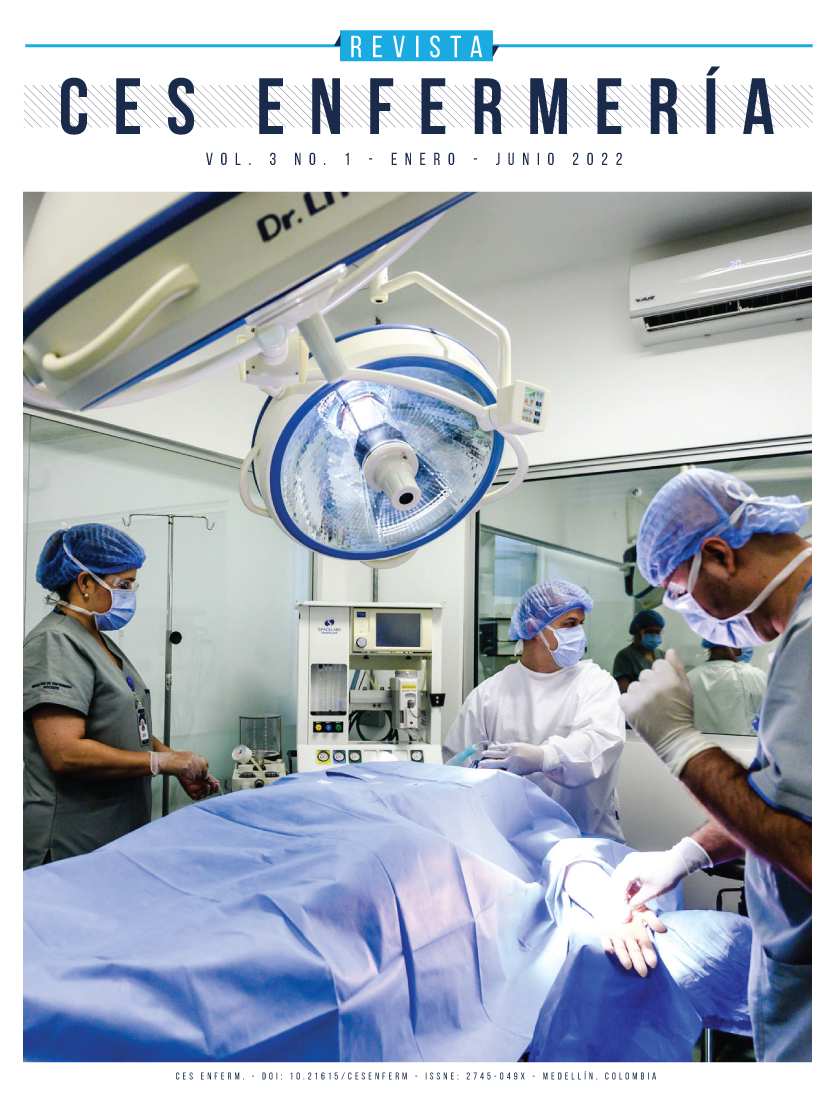Barriers to access for immediate breast reconstruction: women's voices
DOI:
https://doi.org/10.21615/cesenferm.6615Keywords:
breast neoplasms, mammoplasty, health services accessibility, qualitative researchAbstract
Introduction: immediate post-mastectomy breast reconstruction is an important component of comprehensive breast cancer treatment. In spite of this, in Colombia, women face several barriers to access this stage of treatment. Objective: to understand the barriers to access to immediate breast reconstruction faced by women and the actions developed to overcome them, based on the voices of the women and the plastic surgeons who attended them. Method: descriptive qualitative research conducted during 2019, involving 13 women reconstructed immediately after mastectomy and residents of the Department of Huila (southern Colombia) and the 4 plastic surgeons of the region. The information was collected through a focus group discussion and 10 semi-structured interviews that were analyzed using the thematic analysis technique. Results: three themes emerged: (i) Administrative barriers to access to immediate breast reconstruction, which describes the denials and delays of authorizations for the surgical procedure; (ii) Legal actions to address barriers to access, account for the participants' obligation to file legal remedies to access care; and (iii) Non-legal actions to address barriers to access, were the individual non-legal actions that women developed parallel to the filing of legal remedies. Conclusions: this is a first qualitative approach that accounts for women's difficulties in accessing immediate breast reconstruction as a result of administrative barriers imposed by insurers; unveiling the urgency of analyzing the structure of the Colombian health system for access to comprehensive breast cancer treatment and of other studies to increase understanding on the subject.
Downloads
References
Bray F, Ferlay J, Soerjomataram I, Siegel RL, Torre LA, Jemal A. Global cancer statistics 2018: GLOBOCAN estimates of incidence and mortality worldwide for 36 cancers in 185 countries. A Cancer Journal for Clinicians. 2018;68(6):394-424.
Butler PD, Familusi O, Serletti JM, Fox JP. Influence of race, insurance status, and geographic access to plastic surgeons on immediate breast reconstruction rates. The American Journal of Surgery. 2018;215(6):987-94.
Cheng HM, McMillan C, Lipa JE, Snell L. A Qualitative Assessment of the Journey to Delayed Breast Reconstruction. Plastic surgery. 2017;25(3):157-62.
Egurrola JA, Gómez LR, Ossa CA, Sánchez V, Herazo F, García HI. Diferencias en supervivencia debidas al aseguramiento en salud en pacientes con cáncer de mama atendidas en un centro oncológico de referencia en Medellín, Colombia. Cadernos de Saúde Pública. 2018;34(12): :e00114117.
Sánchez G, Laza C, Estupiñán C, Estupiñán L. Barreras de acceso a los servicios de salud: narrativas de mujeres con cáncer de mama en Colombia. Revista Facultad Nacional de Salud Pública. 2014;32:305-13.
Sánchez G, Niño CG, Estupiñán AC. Determinantes del tratamiento oportuno en mujeres con cáncer de mama apoyadas por seis organizaciones no gubernamentales en Colombia. Revista Facultad Nacional de Salud Pública. 2016;34:297-305.
Cárdenas WIL, Pereira AMM, Machado CV. Trajetória das relações público-privadas no sistema de saúde da Colômbia de 1991 a 2015. Cadernos de Saúde Pública. 2017;33.
Pinilla MY, Abadía CE. Hospital San Juan de Dios: actor and victim of the public policies in Colombia. Revista peruana de medicina experimental y salud pública. 2017;34(2):287-92.
Global Cancer Observatory. Estimated number of new cases in 2020, Colombia, males, all ages. 2022. [citado febrero 2021]. Disponible en: https://gco.iarc.fr/today/online-analysis-table?v=2020&mode=cancer&mode_population=continents&population=900&populations=170&key=asr&sex=1&cancer=39&type=0&statistic=5&prevalence=0&population_group=0&ages_group%5B%5D=0&ages_group%5B%5D=17&group_cancer=0&include_nmsc=0&include_nmsc_other=1
Abadía CE, Oviedo DG. Bureaucratic Itineraries in Colombia. A theoretical and methodological tool to assess managed-care health care systems. Social Science & Medicine. 2009;68(6):1153-60.
Thompson L, Walker AJ. The Place of Feminism in Family Studies. Journal of Marriage and Family. 1995, 57(4):847-865.
Thompson L. Feminist Methodology for Family Studies. Journal of Marriage and Family. 1992;54(1):3-18.
Palinkas LA, Horwitz SM, Green CA, Wisdom JP, Duan N, Hoagwood K. Purposeful Sampling for Qualitative Data Collection and Analysis in Mixed Method Implementation Research. Administration and policy in mental health. 2015;42(5):533-544.
Patton MQ. Qualitative research & evaluation methods: Integrating theory and practice. Los Angeles: SAGE, 2015.
Mason M. Sample Size and Saturation in PhD Studies Using Qualitative Interviews. Forum: Qualitative Social Research. 2010;11(3):1-19.
Clarke V, Braun V. Teaching thematic analysis: Overcoming challenges and developing strategies for effective learning. The Psychologist. 2013;26:120-3.
Colombia, Ministerio de salud. Resolución 8430, por la cual se establecen las normas científicas y técnicas de la investigación en salud. Bogotá. 1993.
Yang RL, Newman AS, Lin IC, Reinke CE, Karakousis GC, Czerniecki BJ, et al. Trends in immediate breast reconstruction across insurance groups after enactment of breast cancer legislation. Cancer. 2013; 119(13):2462-8.
Colombia, Congreso de la República. Ley 1384 de 2010: “Ley Sandra Ceballos” por la cual se establecen las acciones para la atención integral del cáncer en Colombia. Bogotá, 2010.
Connell CL, Wang SC, Crook L, Yadrick K. Barriers to Healthcare Seeking and Provision Among African American Adults in the Rural Mississippi Delta Region: Community and Provider Perspectives. Journal of community health. 2019;44(4):636-45.
Coroneos CJ, Roth-Albin K, Rai AS, Rai AS, Voineskos SH, Brouwers MC, et al. Barriers, beliefs and practice patterns for breast cancer reconstruction: A provincial survey. Breast. 2017;32:60-5.
Martínez-Parra AG, Pinilla-Alfonso MY, Abadía-Barrero CE. Sociocultural dynamics that influence Chagas disease health care in Colombia. Soc Sci Med. 2018; 215:142-50.
Vargas I, Mogollón AS, De Paepe P, Ferreira da Silva MR, Unger JP, Vázquez ML. Barriers to healthcare coordination in market-based and decentralized public health systems: a qualitative study in healthcare networks of Colombia and Brazil. Health Policy Plan. 2016; 31(6):736-48.
Lamprea E. The Judicialization of Health Care: A Global South Perspective. Annual Review of Law and Social Science. 2017; 13(1):431-49.
Martínez-Parra AG, Pinilla-Alfonso MY, Abadía-Barrero CE. Sociocultural dynamics that influence Chagas disease health care in Colombia. Social Science & Medicine. 2018;215:142-50.
Sánchez G. Cáncer de piel no melanoma: Riesgos e itinerarios. Bogotá: Ed. Universidad Nacional de Colombia. 2013.
Morse JM. Critical Analysis of Strategies for Determining Rigor in Qualitative Inquiry. Qualitative Health Research. 2015;5(9):1212-1222.
Downloads
Published
How to Cite
Issue
Section
License
Copyright (c) 2022 CES Enfermería

This work is licensed under a Creative Commons Attribution-NonCommercial-ShareAlike 4.0 International License.



